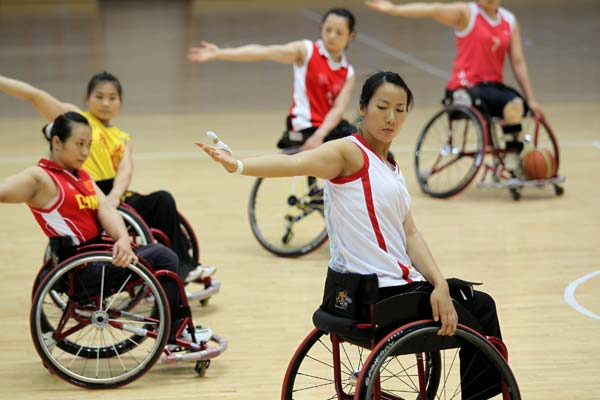We shall overcome
Updated: 2012-08-13 09:26
By Wang Ru (China Daily)
|
|||||||||||
 |
|
The Chinese women's national wheelchair basketball team practise their maneuvers at the China Disabilities Training Center (CDTC). Photos by Jiang Dong / China Daily |
|
|||
The athletes are aged from 15 to 50 and include farmers, students, soldiers and the self-employed from every part of China. A total of 282 Chinese sportsmen and women will compete in the London 2012 Paralympic Games from Aug 29 to Sept 9, together with 4,200 other athletes from all over the world.
About half of our athletes are now training at the China Disability Sports Training Center in Beijing. Built in 2007, it is the world's largest such sport facility and falls under the auspices of the China Administration of Sports for Persons with Disabilities (CASPD).
Jiang Fuying, 24, is one of the athletes in training. In the 2008 Paralympic Games in Beijing, Jiang won the gold medal for the 50m butterfly stroke event and broke the world record.
She was a late starter and did not learn how to swim as a child even though she grew up along the Yangtze River. She was born with amyotrophy, a result of polio, and grew up in an orphanage in Jingzhou, in Central China's Hubei province.
"At school, I had a strong inferiority complex and was reluctant to communicate with others. Swimming changed my life," says Jiang, who learnt swimming in a week. In 2002, she joined the provincial swimming team.
"Swimming is a challenge for a disabled person, especially if the handicap is in the arms and legs.
"It means the athletes have to expose their disabilities, but in return, it make them more confident when they overcome it," says Zhang Honghu, coach of the Chinese national swimming team of athletes with disabilities.
Zhang, known as the "godfather" of handicapped swimming in China, has been the coach of the national team for two decades.
In London, he will be attending his sixth Paralympics.
"At the Barcelona 1992 Paralympic Games, the whole of China's delegation had only 34 athletes," Zhang recalls.
In 1992, China won 11 gold medals and was ranked 11th on the medal tally. In 2008 at the Beijing Paralympics, China won 89 gold medals and topped the ranks.
"Our improved performance reflects China's growth in the promotion of welfare for people with disabilities," says Wang Weiping, the general director of CASPD.
Over the past two decades, these changes are most visible in Zhang and his swimming team.
"In 1996, we couldn't afford to rent an indoor swimming pool to prepare for the Games, so we found an outdoor pool even though it was winter," Zhang says.
"We covered the pool with plastic sheets like a green house, and boiled water to generate steam to keep warm."
Related Stories
Spice Girls to star in Olympics closing ceremony 2012-08-10 15:33
One Direction to perform at Olympics Closing Ceremony 2012-08-09 13:55
Puppets battle it out on London stage 2012-08-08 14:19
Faster than a cheetah, higher and stronger 2012-08-08 10:15
Highlights of London Olympic opening ceremony 2012-08-06 17:42
Today's Top News
Rescuers race against time for quake victims
Telecom workers restore links
Coal mine blast kills 18 in Jilin
Intl scholarship puts China on the map
More bird flu patients discharged
Gold loses sheen, but still a safe bet
US 'turns blind eye to human rights'
Telecom workers restore links
Hot Topics
Lunar probe , China growth forecasts, Emission rules get tougher, China seen through 'colored lens', International board,
Editor's Picks

|

|

|

|

|

|










